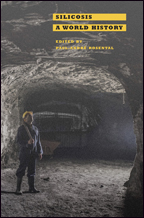Activités de 2015-2021 |
Actualités 2017
Silicosis. A world history
Mardi 27 juin de 9h-11h - Présentation d'ouvrage

Présentation
Une séance de discussion du livre récemment publié sous la direction de Paul-André Rosental, Silicosis. a world History , John Hopkins University Press
Despite the common perception that "black lung" has been relegated to the dustbin of history, silicosis remains a crucial public health problem that threatens millions of people around the world. This painful and incurable chronic disease, still present in old industrial regions, is now expanding rapidly in emerging economies around the globe. Most industrial sectors—including the metallurgical, glassworking, foundry, stonecutting, building, and tunneling industries—expose their workers to lethal crystalline silica dust. Dental prosthodontists are also at risk, as are sandblasters, pencil factory workers in developing nations, and anyone who handles concentrated sand squirt to clean oil tanks, build ships, or fade blue jeans.
In Silicosis, eleven experts argue that silicosis is more than one of the most pressing global health concerns today—it is an epidemic in the making. Essays explain how the understanding of the disease has been shaken by new medical findings and technologies, developments in industrializing countries, and the spread of the disease to a wide range of professions beyond coal mining. Examining the global reactions to silicosis, the authors trace the history of the disease and show how this occupational health hazard first came to be recognized as well as the steps that were necessary to deal with it at that time.
Adopting a global perspective, Silicosis offers comparative insights into a variety of different medical and political strategies to combat silicosis. It also analyzes the importance of transnational processes—carried on by international organizations and NGOs and sparked by waves of migrant labor—which have been central to the history of silicosis since the early twentieth century. Ultimately, by bringing together historians and physicians from around the world, Silicosis pioneers a new collective method of writing the global history of disease. Aimed at legal and public health scholars, physicians, political economists, social scientists, historians, and all readers concerned by labor and civil society movements in the contemporary world, this book contains lessons that will be applicable not only to people working on combating silicosis but also to people examining other occupational diseases now and in the future.
Contributors: Alberto Baldasseroni, Francesco Carnevale, Éric Geerkens, Martin Lengwiler, Gerald Markowitz, Jock McCulloch, Joseph Melling, Julia Moses, Paul-André Rosental, David Rosner, Bernard Thomann
Lieu
Sciences Po (Salle Goguel)
56, rue des Saint Pères
75007 Paris
 Actualités
Actualités
Aux sources des politiques sociales : décentrer l’histoire du welfare européen (XIXe-XXIe siècles)
 Journée(s) d'étude - Lundi 5 novembre 2018 - 10:00Journée d'étude organisée par Eléonore Chanlat-Bernard (doctorante, CRH-ESOPP) et Federico del Giudice ((doctorant, CRH-ESOPP)Les échelles de la question sociale au XIXe siècle" est la première d'un cycle de trois journées d'étude organisé par Éléonore Chanlat-Bernard et Federico Del Giudice (doctorants EHESS, CRH-ESOPP) avec le soutien de l’IRIS "Études Globales" de l'université PSL et du Centre de recherches historiques de l'EHESS.Cette pre(...)
Journée(s) d'étude - Lundi 5 novembre 2018 - 10:00Journée d'étude organisée par Eléonore Chanlat-Bernard (doctorante, CRH-ESOPP) et Federico del Giudice ((doctorant, CRH-ESOPP)Les échelles de la question sociale au XIXe siècle" est la première d'un cycle de trois journées d'étude organisé par Éléonore Chanlat-Bernard et Federico Del Giudice (doctorants EHESS, CRH-ESOPP) avec le soutien de l’IRIS "Études Globales" de l'université PSL et du Centre de recherches historiques de l'EHESS.Cette pre(...)
Régulations économiques et sociales au XXe siècle
 Journée(s) d'étude - Mercredi 4 avril 2018 - 09:00Le XXe siècle a été celui de la régulation économique et sociale de très grande ampleur, à l’échelle tant nationale que transnationale. Cette journée d’étude, organisée par Paul-André Rosental (Sciences Po-ESOPP), en abordera des aspects centraux (consommation, niveau de vie, protection sociale) dans un cadre comparatif entre Europe, États-Unis et Japon. Elle ne se contentera pas d’observer les modalités macropolitiques et macroéconomiques de(...)
Journée(s) d'étude - Mercredi 4 avril 2018 - 09:00Le XXe siècle a été celui de la régulation économique et sociale de très grande ampleur, à l’échelle tant nationale que transnationale. Cette journée d’étude, organisée par Paul-André Rosental (Sciences Po-ESOPP), en abordera des aspects centraux (consommation, niveau de vie, protection sociale) dans un cadre comparatif entre Europe, États-Unis et Japon. Elle ne se contentera pas d’observer les modalités macropolitiques et macroéconomiques de(...)
« Urgences » : ce que vaut le sauvetage de la vie humaine
 Séance spéciale de séminaire - Mercredi 1 mars 2017 - 15:00Inscrits dans des logiques politiques et économiques, fondés sur des techniques et des savoirs médicaux, les dispositifs mis en place par les sociétés contemporaines pour porter secours aux individus en détresse vitale sont un observatoire de la valeur accordée aux vies humaines. Etudier les principes, ressources et pratiques des acteurs du secours, professionnels et bénévoles, permet de revenir sur l’élaboration de l’urgence comme c(...)
Séance spéciale de séminaire - Mercredi 1 mars 2017 - 15:00Inscrits dans des logiques politiques et économiques, fondés sur des techniques et des savoirs médicaux, les dispositifs mis en place par les sociétés contemporaines pour porter secours aux individus en détresse vitale sont un observatoire de la valeur accordée aux vies humaines. Etudier les principes, ressources et pratiques des acteurs du secours, professionnels et bénévoles, permet de revenir sur l’élaboration de l’urgence comme c(...)
ESOPP
Centre de Recherches Historiques - EHESS
54, boulevard Raspail
F-75006 Paris
ESOPP a été dissout en jnavier 2023.
Illustrations : ESOPP et CEDIAS-Musée social.
Dernière modification :
16 mai 2023 12h07


